
How Green Was My Valley is a 1939 novel by Richard Llewellyn, narrated by Huw Morgan, the main character, about his Welsh family and the mining community in which they live. The author had claimed that he based the book on his own experiences, but this was found after his death to be untrue; Llewellyn was English-born and spent little time in Wales, though he was of Welsh descent. Llewellyn gathered material for the novel from conversations with local mining families in the village of Gilfach Goch, in southeast Wales.
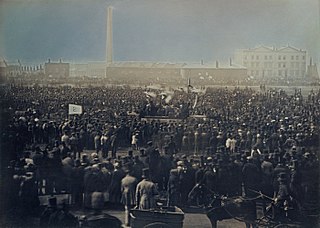
Chartism was a working-class movement for political reform in the United Kingdom that erupted from 1838 to 1857 and was strongest in 1839, 1842 and 1848. It took its name from the People's Charter of 1838 and was a national protest movement, with particular strongholds of support in Northern England, the East Midlands, the Staffordshire Potteries, the Black Country and the South Wales Valleys, where working people depended on single industries and were subject to wild swings in economic activity. Chartism was less strong in places, such as Bristol, that had more diversified economies. The movement was fiercely opposed by government authorities, who finally suppressed it.

Pontypool is a town and the administrative centre of the county borough of Torfaen, within the historic boundaries of Monmouthshire in South Wales. As of 2021, it has a population of 29,062.

Blaenavon is a town and community in Torfaen county borough, Wales, high on a hillside on the source of the Afon Lwyd. It is within the boundaries of the historic county of Monmouthshire and the preserved county of Gwent. The population is 6,055.

Llanfoist is a village near Abergavenny, in Monmouthshire, Wales, in the community of Llanfoist Fawr. Llanfoist derives from Ffwyst, an early Christian Welsh saint, although the anglicised version of the church patron is Saint Faith. The population was 1,228 in 2011.
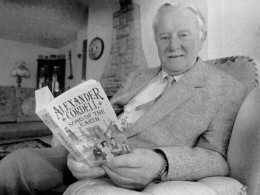
Alexander Cordell was the pen name of George Alexander Graber. He was a prolific Welsh novelist and author of 30 acclaimed works which include, Rape of the Fair Country, Hosts of Rebecca and Song of the Earth.
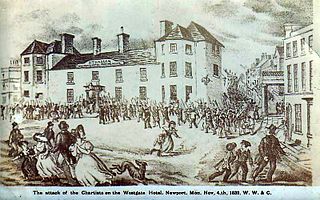
The Newport Rising was the last large-scale armed rising in Wales, by Chartists whose demands included democracy and the right to vote with a secret ballot.
Richard Lewis, known as Dic Penderyn, was a Welsh labourer and coal miner who lived in Merthyr Tydfil and was involved with the Merthyr Rising of 3 June 1831. In the course of the riot he was arrested alongside Lewis Lewis, one of the primary figures in the uprising, and charged with stabbing a soldier with a bayonet. The people of Merthyr Tydfil doubted his guilt, and signed a petition for his release. However, he was found guilty and hanged on 13 August 1831. After his death he was treated as a martyr in Merthyr and across Wales.

Song of the Earth is a novel by Alexander Cordell, first published in 1969. It is the final book of Cordell's "Mortymer Trilogy".

Crawshay Bailey was an English industrialist who became one of the great iron-masters of Wales.
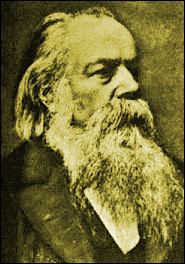
Henry Vincent was an English religious leader. active in the formation of early Working Men's Associations in Britain, a popular Chartist leader, brilliant and gifted public orator, prospective but ultimately unsuccessful Victorian member of parliament, and later an anti-slavery campaigner.

Pygmy is an epistolary novel by Chuck Palahniuk. It was released on May 5, 2009.

Blaenavon Ironworks is a former industrial site which is now a museum in Blaenavon, Wales. The ironworks was of crucial importance in the development of the ability to use cheap, low quality, high sulphur iron ores worldwide. It was the site of the experiments by Sidney Gilchrist Thomas and his cousin Percy Gilchrist that led to "the basic steel process" or "Gilchrist–Thomas process".
Predominantly centred on Hanley and Burslem, in what became the federation of Stoke-on-Trent, the 1842 Pottery Riots took place in the midst of the 1842 General Strike, and both are credited with helping to forge trade unionism and direct action as a powerful tool in British industrial relations.
Sir Jeremiah Homfray was an English ironmaster, best known for mineral developments in South Wales for and starting the Ebbw Vale ironworks.
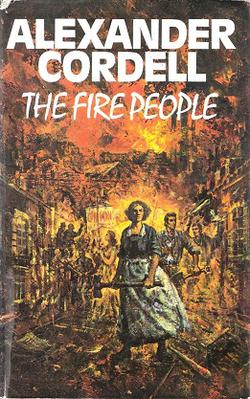
The Fire People is a historical novel by Alexander Cordell, first published in 1972. It forms part of the 'Second Welsh Trilogy' of Cordell's writings. It tells of events leading up to the 1831 Merthyr Rising in Merthyr Tydfil and surrounding areas in South Wales.

The Pwll Du Tunnel was the longest horse-powered tramway tunnel to be built in Britain at 1,875 metres (6,152 ft) in length. It started in Blaenavon, Torfaen, Wales, and was originally a coal mine, running northward almost horizontally into a hillside. Later it was extended right through the hill and used to carry limestone from quarries at Pwll Du and Tyla to the ironworks at Blaenavon, and to carry pig iron from Blaenavon to the Garnddyrys Forge. The tramway was extended past Garnddyrys to Llanfoist Wharf on the Brecknock and Abergavenny Canal. The tramway from Pwll Du to the canal fell out of use when the railway came to Blaenavon and the Garnddyrys forge was closed in 1860, but the tunnel continued to be used to carry limestone to Blaenavon until 1926. It is now a scheduled monument and part of a UNESCO World Heritage Site.

Garnddyrys Forge was an iron foundry in Wales that operated from about 1817 to 1860 about 3 km north of Blaenavon in Wales, lying on a tramroad between Blaenavon and the Brecknock and Abergavenny Canal. At one time 450 people lived around the ironworks. It became isolated when the railway took a different route to Blaenavon, and was abandoned. Although little now is visible, it is archaeologically well-preserved.

Pwll Du was a village in Monmouthshire, Wales. It was declared a slum in 1960 and demolished in 1963. The main employment was provided by nearby limestone quarries and by the iron works in Blaenavon. The Pwll Du Tunnel from Blaenavon, once the longest horse-powered tramway in Britain, ended near the village. A pub and the former Welfare Hall, now a school's outdoor pursuits centre, are all that are left standing.
Thomas Hill of Dennis, also known as Thomas Hill or latterly Thomas Hill I, to distinguish him from his son, was an ironmaster, and the leading partner in the establishment of Blaenavon Ironworks in south east Wales.
















